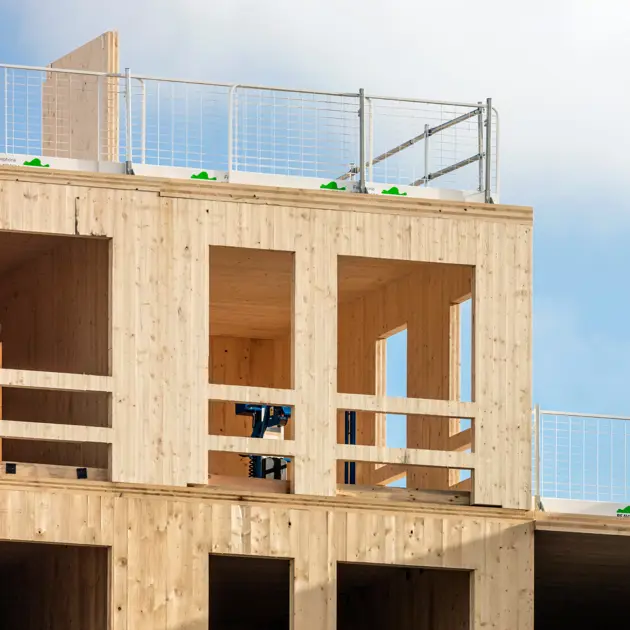Uniting Workers for a Just Transition: An Interview with Ambet Yuson
To achieve the transition to a just, equitable and green economy we need a workforce to match. Laudes Foundation works with the Building and Wood Workers’ International (BWI) on researching future work in construction, focusing on how climate change and technological innovation may transform locations, quality and skills. BWI General Secretary, Ambet Yuson, tells us what drives him and his team.
When did you know you wanted to work in your field?
In the Philippines, when I was young, I joined the fight against President Ferdinand Marcos after he had declared martial law and had become a dictator. I did not know that I would work in the trade union movement, but I knew that I wanted to organise, work with others, and help make a difference. It was also an inspiring experience because we succeeded.
What’s the best piece of advice you’ve ever received?
To listen. In trade unions, leaders are important, but the power remains in the hands of the members. Authority is earned. It is not granted with a title. I notice that in our work with companies, their representatives look to the top for guidance, whereas we look to member organisations and the workers they represent.
Education or practical experience – what do you value more?
One of the most important contributions of schools is that you can learn how to learn. It is exciting that I am in a position where I learn every day. Things change quickly. It is not possible to go back to school every time there is a new challenge. Climate change is an example of an issue where we have - urgently - had to learn, reflect, and act. Losing the fight for a just transition would mean leaving millions of workers in construction, forestry and building materials in fear and dismay, conditions on the jobs becoming more dangerous, and communities and livelihoods broken. We cannot afford to lose. We have to quickly do the right thing and do it right.
What do you find most fulfilling in your work?
For me and the staff, but also the affiliates, there is great satisfaction in making a difference or in giving hope to trade unionists in difficult situations. You could see that at the BWI Congress in October of 2022 when migrant worker leaders from Qatar described their struggle and thanked delegates for supporting rather than abandoning them.
What is the biggest hurdle you have faced in the past year and how did you overcome it?
After nearly a decade of work to help protect the rights and improve the working conditions of migrant construction workers in Qatar – toiling under intense heat with little protections let alone collective agency – in the run-up to the World Cup, progress stopped. It has resumed and things are moving in the right direction again. I am convinced that it happened because they have realised that protecting the rights of workers is in their interests too.
"We are conscious of the power of workers when they act together. The same agency is needed to accelerate the transition."
At Laudes we know that we need to work collectively to change the systems that affect all of us. What is one way you’ve achieved impact or moved the needle in collaboration with another organisation?
We argue that change is likely to be smoother and more effective if workers and their trade unions are involved in sustainability discussions from the beginning. Too often, that idea is accepted in theory, but not in practice. Too often, decisions taken at the global, regional or national level run short of considering communities and workers’ needs on the ground. However, in our work with the C40, a global cities network, we have found that they are as committed as we are to making progress, ensuring that cities are greener, community life is improved, and that workers develop skills and opportunities and have good, secure jobs. Our local engagement helps dealing with the fears and insecurity of workers to be the ones who are losing out.
How has your vision changed since the organisation first started?
The vision of BWI is determined at its Congresses, which are held every four years. Congress continues to make policy in many areas. Congress adopts policies, but it also agrees a strategic plan for the coming Congress period so that policies and actions re-enforce each other. However, in recent years, different priorities have been more closely linked in common strategies. They are not fixed in cement as unexpected crises like the COVID-19 pandemic or the coup in Myanmar arise between Congresses and the World Executive gives priority to such emergencies.
What is one thing your organisation needs most to be successful?
BWI has limited financial means. The labour market in construction, especially in some parts of the world, is made of high shares of informal and migrant workers, who cannot afford paying high union affiliation fees. Like most Global Unions, our membership has grown in parts of the world where unions pay the lowest fees and has shrunk in countries that pay the highest fees. If there is something the climate crisis has taught us, is that it affects us all. Some more than others. Despite its financial limits, BWI is successful.
If you had to choose one challenge you [and your team] need to tackle to accelerate this transition, what would that be?
Despite being spread too thin, BWI is effective. That is because of international solidarity. Where we can’t reach with our own staffing resources, we reach with support of our affiliates. Sometimes, the “team” includes the affiliates. For example, when there are agreed global campaigns, having active affiliates means that BWI is better able to mobilise than much larger Global Unions. A striking example is the contribution of BWI to making Occupational Safety and Health a Fundamental Principle and Right at Work at the ILO. Not only did our affiliates lobby their governments, but they also signed 450 agreements with companies to support the addition of that fundamental right, covering more than 74 countries, 480,000 workplaces and 18 million workers.
About Ambet Yuson
Ambet Yuson is the General Secretary of the Building and Wood Workers’ International (BWI), a Global Union Federation representing 12 million workers in building and construction, allied materials and forest industry workers affiliated to 361 trade unions in 115 countries across the globe.
As General Secretary, Ambet led the global dialogue and negotiation with leading construction, wood and forestry multinational enterprises for an international framework agreement committing them to comply with the ILO Fundamental Principles and Rights at Work; the OECD Guidelines on Multinational Enterprise and the UN Guiding Principles on Business and Human Rights.
Ambet represents BWI in various engagements advocating labor rights with the World Bank, ADB and other regional development banks; with the WEF Infrastructure Group; with the various certification bodies such as the FSC, PEFC (for wood and forestry) and the Blue dot Network (for infrastructure); and with the C40 and the built environment networks on just transition and green jobs.
-

By Ambet Yuson
General Secretary, Building and Wood Workers' International (BWI)


